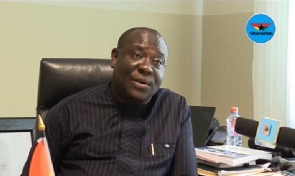 Vincent Odotei Sowah, Deputy Communication Minister
Vincent Odotei Sowah, Deputy Communication Minister
Deputy Minister for communication, Vincent Odotei Sowah has urged Ghanaians to take precautions in sharing vital and personal information to people on cyberspace.
According to him, Ghanaians must take full take responsibility in knowing what to do on cyberspace to reduce crime-related issues.
Mr. Adotei advised that one should ensure they have anti-virus and firewalls installed on their phones, laptops to prevent hacking; and also take precautions when clicking sites that pop up on their device.
“50 per cent of the breaches in the cyberspace starts with ignorance or clicking from the individual, so its important awareness creation is key and featured strongly in any effort fight cybercrime. That is why every month we create the awareness of cybersecurity.
It is important that all of us understand the paroles of using technology, 50 percent of the vulnerability which is breached arrive out of individual negligence or irresponsibility. I want everyone to realize that anything they do online must be something they can do in the physical world. You cannot just walk on the street give anyone your ID, if you can’t do that in the physical world why would you do that on cyberspace. Why would you give your naked picture of yourself to people on cyberspace?" He quizzed.
The Ministry of Communications in October, 2017 launched the National Cyber Security Week in to scale-up public awareness on cybercrime and sensitize the populace on the country’s preparedness to deal with the phenomenon.
This is to offer an opportunity to share information and engage key stakeholders on how to ensure an effective and robust cybersecurity ecosystem in the country.
Cybercrime includes cyber-related fraud, popularly called in the local parlance “Sakawa,” mobile money transfer fraud, child pornography, election rigging and violation of computer network security, industrial espionage, and identification theft.
Some existing legislation that regulates cybercrime in Ghana includes the Electronic Crimes Act, 2008 (Act 775), the Electronic Transactions Act, 2008 (Act 771) and the Data Protection Act, 2012, Act (843).